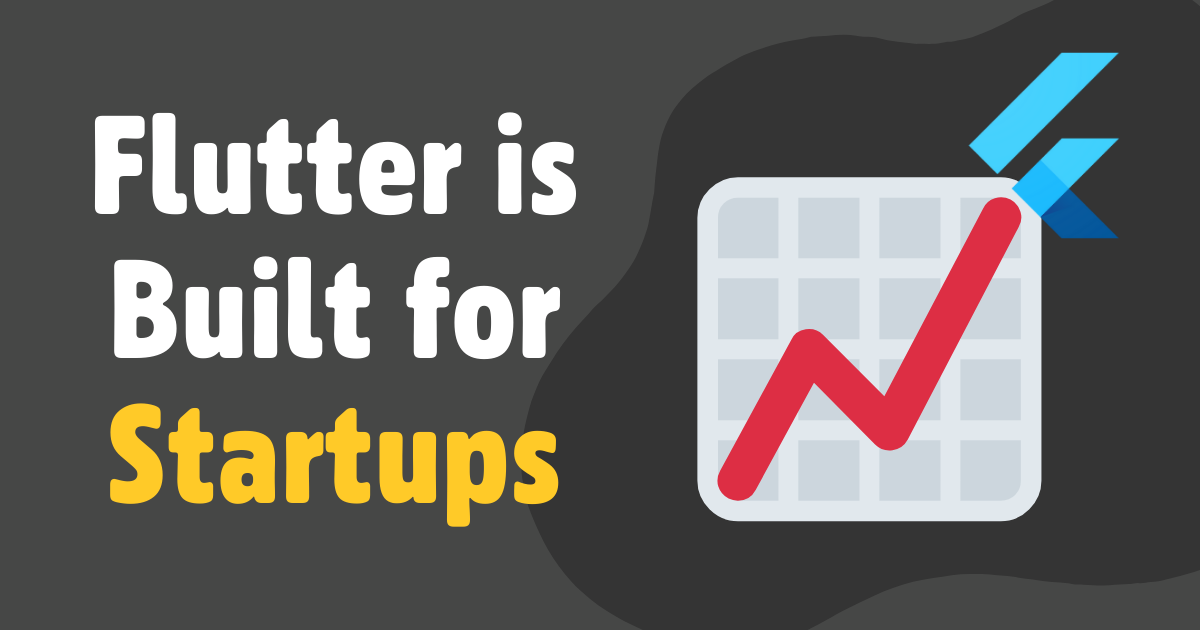Why Flutter is the Best Framework for Startups

Through the years, I've come to realize that in the startup world, speed isn't just an advantage—it's the lifeline. As a former CTO of a YC-backed startup, having launched more than five apps—with the latest one hitting over $10K in revenue in under three months—I've witnessed the undeniable power of rapid iteration. This ability to quickly build, launch, gather feedback, and refine is what really distinguishes the seasoned entrepreneurs from the novices. It's what makes or breaks a startup.
With this in mind, I've found that Flutter stands out as the best tool for achieving quick iterations. In this blog post, I dive deep into why I believe in Flutter's capabilities. I'll share insights from my current startup's workflow using Flutter, discuss some challenges I've encountered along the way, and outline precisely why I consider it a superior choice for any startup looking to move quickly and efficiently.
My Typical Development cycle with Flutter as a Startup Founder
From my experience, this workflow has been my go-to. Even for my current startup, I validated the idea with a Reddit post, then created a web app, and marketed and iterated based on customer feedback. I was able to go from idea to product to revenue in just under a week. You can do so too by following this approach. If you're curious about how I structured my code, check out my open-source Flutter boilerplate.
- Idea Validation: Before doing the work, I like to test the waters. For example, I check popular posts on reddit to see if there's a genuine interest in my product. This step is critical—no point in building something that nobody wants.
- Landing page with Framer: Next, I create a landing page that conveys what I want to sell. This will be the first touchpoint for potential customers, making it a critical step in validating the product's market fit.
- Web App Development with Flutter: Once I'm sure that this is something people want, I start developing a web app using my open-source Flutter production boilerplate. Here’s why I start with only web in Flutter:
- Speed: Deploying a web app is immediate, bypassing the lengthy approval times of app stores.
- Accessibility: A web link is universal, making it easy for users to access and provide feedback without the barriers of downloading from an app store.
- Iterate Based on Customer Feedback: This is where the magic happens. This step is iterative and ongoing, shaping the product to fit the users' needs perfectly.
- Expanding to Mobile and Desktop: Only when there is demand, or I recognize a clear growth path through other platforms, do I consider expanding. Flutter’s cross-platform capability means that transitioning to other platforms is seamless. I treat this as another feature in the pipeline—important, but always prioritized alongside other development needs.
- Unified Codebase, Continuous Iteration: With a single codebase, I continue to evolve the app, making enhancements and adding features based on user feedback and market trends. The beauty of Flutter means every iteration benefits all platforms simultaneously.
If you liked what you read above, I also wrote a more in-depth guide on how I reached 50k users with Flutter web.
Caveats with using Flutter
Don't Use Flutter as Your Landing Page
Flutter is a tool that enables the creation of apps across multiple platforms — phones, computers, and the web — from a single codebase. While it offers extensive capabilities, it's not without its limitations. Websites developed with Flutter can experience slower initial load times and poor SEO support. This primarily becomes an issue if you're considering Flutter for your landing page, where speed and discoverability are crucial.
Rather than leveraging Flutter for landing pages, a no-code tool like Framer can be a more efficient choice. This approach allowed me to quickly create a landing page that had SEO straight out of the box and saved me precious time as my non-technical team members were able to make changes to the website themselves.
Google's Poor Track Record
Concerns about Google potentially discontinuing Flutter are not unfounded, given its history with other projects (as documented on killedbygoogle.com). However, my confidence in Flutter's longevity remains unshaken.
Here's why: Flutter addresses a significant gap in multi-platform development, offering a more streamlined process than its competitors. Additionally, its adoption is on the rise, with major companies like Alibaba, The New York Times, eBay, and Kijiji embracing Flutter for their applications.
Hiring for Flutter
Some people worry that finding developers who know how to use Flutter might be hard because it's pretty new. This makes sense since not a lot of people have had the chance to learn Flutter yet.
But from what I've seen, it's not really a big problem. Flutter is quite easy to learn and use. I once hired a college intern who only knew how to use React (another way to make apps), and guess what? They were able to start helping out with our Flutter projects after just one week of onboarding. So, if you're thinking of hiring someone, you don't need to find someone who only knows Flutter. A lot of the time, someone who knows JavaScript (a common programming language) can learn Flutter quickly and do a great job. Plus, the language used in Flutter, called Dart, is easy to get if you already know JavaScript or Python. Dart combines the best parts of JavaScript and Python into something new and exciting
So, finding people to work on Flutter projects might seem tough at first because it's new, but it's actually not that bad. Many developers can pick it up quickly and start meaningfully contributing.
Dart (Flutter) vs Javascript
Superior Development Experience
With an understanding of Flutter’s limitations, it’s crucial to explore why I believe Flutter stands out as the premier choice for startups. First and foremost, Flutter offers exceptional language support and a developer experience that far surpasses its JavaScript counterparts.
With Dart, I'm spared the constant null checks, the decision paralysis between using undefined or null, and the confusion over the truthiness of an empty array. JavaScript's ambiguity and redundancy stem from its need to support legacy syntax, whereas Dart (and by extension, Flutter) learns from JavaScript’s missteps, presenting a cleaner, more intuitive language. In my opinion, the A class development experience makes learning and developing on Flutter much faster than it's JS counterpart.
Packages out-of-the-box
Moreover, Flutter is incredibly self-sufficient, providing a wealth of packages right out of the box. This eliminates the need for extensive research on UI libraries or the necessity of third-party libraries for basic functionalities. The ease of access to these tools significantly accelerates the development process, allowing for swift iterations.
Single Codebase
Perhaps the most significant advantage, however, is the ability to maintain a single codebase across multiple platforms. This feature is indispensable, especially for solo developers or small teams. The logistical nightmare of managing separate codebases for different platforms is a well-known pain point that Flutter elegantly solves. Plus, with more people using mobile devices these days, choosing to creating a mobile app vs only having a web app can give you a competitive edge.
Checkout my open-source Flutter Production Boilerplate
Thanks for taking the time to read this! If you're thinking about using Flutter, I've got something that might help you out. Check out my open-source Flutter production boilerplate. It could save you more than 40 hours of setup time! Or, it might just be a good reference for you. It's packed with all the best tips and tricks I've learned from using Flutter for startups over the last 2 years. I really think it could be super useful for anyone looking to dive into Flutter.
